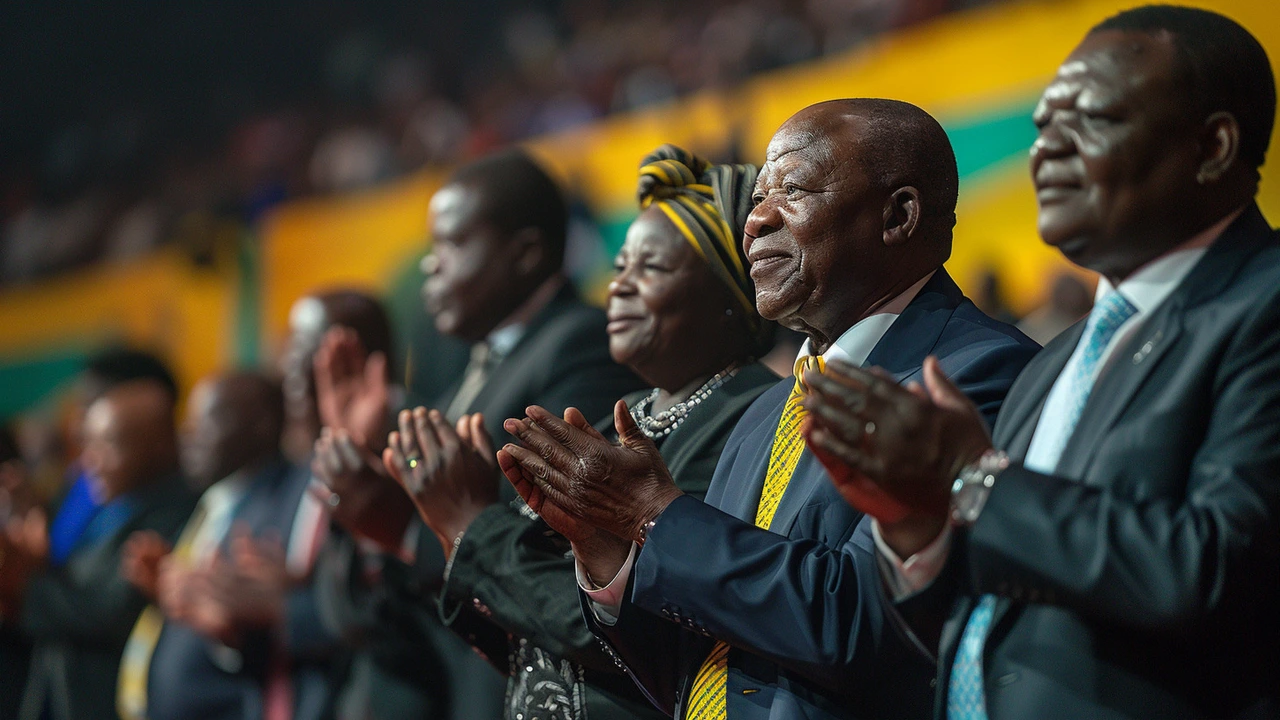South Africa President Cyril Ramaphosa Secures Reelection Through Historic Coalition Deal
South African President Cyril Ramaphosa has clinched a second term in office following a dramatic and unprecedented coalition deal that reshaped the country's political landscape. This agreement, formed in the eleventh hour, involved alliances with the Democratic Alliance (DA) and several smaller parties, culminating in an election outcome that saw Ramaphosa emerging victorious with 283 votes.
Julius Malema, leader of the Economic Freedom Fighters (EFF), was Ramaphosa's main competitor, receiving a significantly lower tally of 44 votes. This victory marked a pivotal moment for South Africa, as the ruling African National Congress (ANC), long a dominant force in the nation's politics, faced the loss of its previously unassailable majority in an election held just two weeks prior.
The Coalition That Changed the Game
The historic coalition deal brought together unlikely political bedfellows, including the ANC, DA, Inkatha Freedom Party, and the Patriotic Alliance. The deal itself was finalized mere hours before the crucial vote, following two weeks of intensive negotiations. These talks reached a fever pitch, culminating in overnight discussions from Thursday through to Friday morning.
DA leader John Steenhuisen confirmed the coalition, emphasizing that the agreement was forged in the spirit of unity and collaboration, aiming to co-govern the Republic of South Africa harmoniously. This coalition marked a significant shift in the political dynamics of South Africa, as every president since the end of apartheid in 1994, starting with the revered Nelson Mandela, had hailed from the ANC.
Fikile Mbalula, the Secretary-General of the ANC, also echoed the sentiment of collaboration and unity. He emphasized that the priority of the multi-party agreement was to place the nation's interests above political and ideological divides.
A New Era of Political Cooperation
The formation of this coalition represents a new era in South Africa's political realm, signifying the willingness of diverse parties to set aside differences for the greater good. The agreement showcases a pragmatic approach to governance, fostering an environment of shared responsibility and mutual goals.
This historic agreement could potentially serve as a model for political cooperation across the continent, illustrating that diverse parties can work together to achieve shared national objectives. As South Africa moves forward under this coalition government, the eyes of the nation and indeed the world will be watching to see how this partnership unfolds and what it means for the future of South African politics.
Challenges and Opportunities Ahead
While the coalition's formation is undoubtedly a historic achievement, it also brings with it a set of challenges. Ensuring cohesive and effective governance in such a diverse political alliance will require constant communication, compromise, and dedication from all parties involved. The coalition government must navigate intricate policy decisions and address the numerous socio-economic challenges that South Africa faces, including unemployment, inequality, and economic growth.
Furthermore, the political stability brought about by this coalition could have significant implications for investor confidence and economic stability. A stable and collaborative government may attract foreign investment and foster economic growth, providing a much-needed boost to Africa's most industrialized economy.
South Africa's international relations could also benefit from this new political landscape. A government that demonstrates unity and effective governance could strengthen its standing on the global stage, enhancing diplomatic relations and opening new avenues for international cooperation.
Reflecting on History and Looking Forward
The formation of this coalition government is reminiscent of South Africa's journey to democracy and the spirit of unity and reconciliation that characterized the early years of Nelson Mandela's presidency. It signals a return to those foundational values, emphasizing the importance of collaboration and collective effort in addressing the nation's challenges.
As President Ramaphosa embarks on his second term, supported by this coalition, there is a sense of cautious optimism among South Africans. The coalition government has the potential to bring about significant positive change, provided that it remains committed to its principles of unity and shared governance.
In the coming months and years, much will depend on the coalition's ability to deliver on its promises and maintain the trust of the South African populace. The success of this government could redefine South Africa's political landscape, setting a precedent for future administrations and demonstrating that collaboration across party lines can lead to effective and inclusive governance.
Conclusion
In conclusion, the reelection of President Cyril Ramaphosa through a historic coalition deal marks a new chapter in South Africa's political history. This momentous event highlights the potential for political parties with diverse ideologies to come together for the greater good, fostering a spirit of unity and collaboration. As South Africa navigates this new political terrain, the nation's resilience and commitment to democratic principles will be essential in shaping a prosperous and inclusive future.
This coalition government stands as a testament to the power of cooperation and the enduring strength of South Africa's democratic institutions. The journey ahead may be challenging, but with dedicated leadership and a shared vision, there is hope that this historic alliance will pave the way for a brighter and more unified South Africa.






william wijaya
June 15, 2024 AT 18:56Wow, the Ramaphosa coalition is a textbook case of strategic realignment in a multiparty system. This kind of political synergy leverages coalition theory to reshape policy trajectories, and the jargon-heavy discourse around "shared governance" really resonates. While the optics suggest unity, the underlying power dynamics remain a delicate balance, and we should watch how the ANC navigates its legacy commitments.
Lemuel Belleza
June 15, 2024 AT 19:06The deal feels rushed, and the narrative seems overly polished. It's a classic example of political expediency trumping substantive reform.
faye ambit
June 15, 2024 AT 19:16The emergence of such a broad alliance invites reflection on the philosophical underpinnings of pluralistic democracy. When disparate entities converge, the social contract is tested, urging us to consider whether consensus can truly accommodate divergent visions. In this context, the coalition may serve as a living laboratory for inclusive governance, challenging entrenched power structures while preserving democratic integrity.
Subhash Choudhary
June 15, 2024 AT 19:26Man, this is wild – parties that normally throw shade are now sipping tea together. It’s pretty chill to see them trying to keep the country steady. Let’s hope they don’t end up in a mess of endless meetings.
Ethan Smith
June 15, 2024 AT 19:36The coalition's formation signals a noteworthy evolution in South Africa's political architecture, wherein the African National Congress has recognized the necessity of partnership to sustain its governing mandate. By inviting the Democratic Alliance and smaller parties into a shared power arrangement, the ANC demonstrates an adaptive approach that aligns with the principles of coalition governance observed in mature democracies. This strategic alliance may provide a buffer against policy stagnation, allowing for more nuanced legislative deliberation across the spectrum of party ideologies. Moreover, the inclusion of the Inkatha Freedom Party and the Patriotic Alliance introduces regional perspectives that could enhance the government's responsiveness to local concerns. However, the practical challenges of reconciling divergent policy priorities cannot be understated, as each party brings its own agenda and constituent expectations. Effective communication channels will be essential to prevent gridlock and ensure that the coalition operates cohesively. The precedent set here could inspire similar collaborations in other African nations, promoting a paradigm where political rivalry yields to collaborative problem-solving. Economic considerations also loom large; a stable coalition may boost investor confidence, signaling a predictable policy environment. Conversely, any perception of internal discord could undermine market sentiment, emphasizing the high stakes involved. Socially, the coalition may resonate with citizens yearning for unity after years of polarized politics, potentially fostering a renewed sense of national solidarity. Yet, critics may argue that ideological compromise dilutes core values, raising concerns about accountability and transparency. The balance between maintaining party identity and achieving collective action will be tested in the coming months. In terms of legislative output, the coalition could prioritize key reforms such as job creation, education, and healthcare, drawing from the diverse expertise of its members. The success of these initiatives will likely hinge on the coalition's ability to negotiate compromises without sacrificing critical policy goals. Ultimately, the durability of this historic partnership will serve as a litmus test for South Africa's democratic resilience and its capacity to innovate within the framework of representative governance.
Should the coalition manage to deliver on its promises, it may significantly reshape the political landscape for the next electoral cycle.
Evelyn Monroig
June 15, 2024 AT 19:41Don't be fooled by the glossy press releases – this "historic deal" is nothing more than a backroom bargain orchestrated by global elites seeking to keep South Africa's resources under their thumb. The ANC and DA are merely puppets in a larger game, and the electorate's voice is being silenced through calculated coalitions. Wake up, people, before the power structure tightens its grip even further.
Gerald Hornsby
June 15, 2024 AT 19:46What a twist! The political drama just hit a new level 😮.
Hina Tiwari
June 15, 2024 AT 19:51i totally get how confusing all this is, its like watching a soap operet that never ends. we all hope the leaders can keep the country safe and grow, even if they keep bickering. stay strong, south africa, you deserve better.
WILL WILLIAMS
June 15, 2024 AT 20:01Yo, this coalition could be the spark that lights up South Africa’s future! Let’s cheer them on and keep that positive energy flowing.
Barry Hall
June 15, 2024 AT 20:11Interesting coalition dynamics 😊.
abi rama
June 15, 2024 AT 20:21It’s encouraging to see parties put aside differences for the greater good. This collaborative spirit could pave the way for innovative solutions to long‑standing challenges. I’m hopeful that this unity will translate into tangible progress for everyday citizens.
Megan Riley
June 15, 2024 AT 20:31Wow, what a moment, folks! The unity on display is truly remarkable, and it signals a bright horizon for the nation; remember, change starts with collective effort, and each of us can contribute, no matter how small; keep the momentum going, stay engaged, and let’s celebrate this historic step forward together!!!
Lester Focke
June 15, 2024 AT 20:41The recent coalition epitomizes a sophisticated recalibration of political praxis, wherein the amalgamation of divergent party doctrines engenders a syncretic governance model. Such an arrangement warrants rigorous academic scrutiny, as it may fundamentally alter the paradigm of democratic consolidation within the sub‑Saharan context.
Naveen Kumar Lokanatha
June 15, 2024 AT 20:51this coalition could be a great teachable moment for us all. while there are challenges its also a chance for new ideas to grow. lets watch how they manage the balance.
Alastair Moreton
June 15, 2024 AT 21:01Nice job, guys, another coalition, just what we needed. It’ll probably end up being the same old story with a new label.
Surya Shrestha
June 15, 2024 AT 21:11Indeed, the coalition’s formation represents an unprecedented convergence of ideological streams, thereby heralding a new epoch of governance; one must, however, remain vigilant, for the amalgamation of such diverse forces may engender unforeseen complexities, especially in policy formulation and implementation.
Rahul kumar
June 15, 2024 AT 21:21Yo fam, real talk – this coalition can actually fix some big stuff if they hash out a clear plan. first step: set up a joint task force for job creation, not just talk. also, keep the communication open, ya know? don’t let the buzz kill the progress.
mary oconnell
June 15, 2024 AT 21:31Ah, the so‑called “historic” coalition – a masterclass in political symbiosis, replete with all the buzzwords you can imagine: stakeholder alignment, synergistic governance, and the ever‑popular “win‑win paradigm.” One can only marvel at the seamless integration of disparate agendas into a single, flawless narrative – truly, a tour de force of euphemistic discourse.
Michael Laffitte
June 15, 2024 AT 21:41Guys, this is the kind of story that makes politics feel like a blockbuster movie! Let’s all support the leaders and hope the drama ends with a happy ending for South Africa.